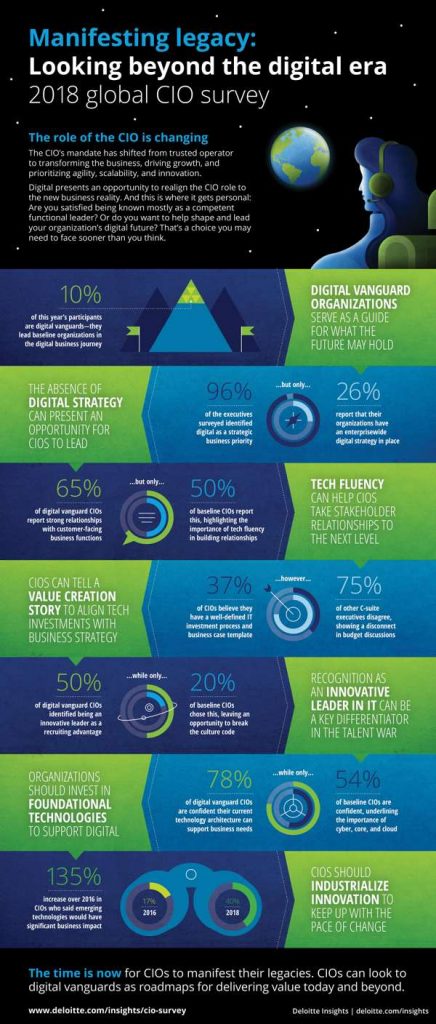Published on the 02/10/2018 | Written by Jonathan Cotton

In the age of change, just what does the role of the CIO entail?..
Deloitte has released its latest (and third and final) CIO survey and it shows, says Deloitte, a huge gap between what CIOs think they are and what they need to be.
This year’s report builds on two previous surveys of more than 1,200 global CIOs and aims to explain how CIOs can transform from meat-and-potatoes ‘trusted operators’ to something more: Leaders of business growth and transformation in the digital era.
First, the bad news. The survey finds, as these sorts of surveys do, that a significant proportion of CIOs are not future-focused. Just 44 percent of CIOs surveyed are ‘neither actively involved in developing nor executing their organisation’s digital strategy’, and just a quarter of respondents, regardless of role, indicate that they have an enterprise-wide digital strategy at all.
That’s understandable. Many CIOs likely find themselves focused on keeping things running smoothly, rather than innovating, and the research confirms that: More than half of the CIOs surveyed say they are still focused on delivering efficient, reliable information technology operations rather being a catalyst for growth and transformation within their organisations.
Understandable or not, that’s a poor state of affairs.
“Although 55 percent of CIOs are currently serving as trusted operators, this pattern type will gradually become obsolete as the digital era progresses,” warns the report.
Now is the moment for CIOs to take the reins, says Deloitte, but with rapidly changing expectations (not to mention the ever-evolving tech), it’s a big ask.
“To remain relevant and influential and help their organisations use technology to enable business strategy, CIOs should develop themselves as change instigators and business cocreators,” advises Deloitte.
[CONTINUES BELOW]
“Every company is a technology company, so it’s critically important for CIOs to know and partner with the entire business, be involved in enterprise strategy and cooperate closely with corporate boards,” says Kristi Lamar, co-author of the report and MD at Deloitte Consulting LLP’s CIO Program. “Those that don’t will struggle to adjust to technological change.”
And pressure is mounting. Survey respondents indicate that the top two expectations on CIOs are ‘to align to business strategy’ and ‘transform business processes;, with ‘IT operational excellence’ trailing in third place.
It’s a pity then that 60 percent of CIOs surveyed say they don’t have leadership roles in developing enterprise digital strategy.
“Yes, CIOs should build and maintain solid back-end core systems, but they also need to leverage digital technologies to streamline business processes, engage employees and customers and drive new value-generating business models,” says the report’s authors.
If that sounds like something that will require more than a little effort, it is, but that’s the challenge currently facing CIOs: The role has not only expanded and transformed, but is continuing to transform, and you’d better be growing and transforming with it.
But how?
Deloitte says that in 2018 CIOs need a better grasp on the big picture, and that means looking ‘inward’, ‘across’ and ‘beyond’ the business.
“The digital era presents CIOs with the opportunity to look inward and reinvent themselves by breaking out of the trusted operator mould,” says the report.
“We note, as in previous surveys, the importance of strong relationships to the CIO’s business success. This year we suggest that developing a technology fluency programme can help create a solid foundation for these relationship-building efforts. A tech fluency programme can provide organisations with knowledge about technology trends, scalability of emerging technologies and complexities of managing legacy core systems – while enabling CIOs to understand internal and external customer perspectives.
“CIOs can also look across the IT organisation and transform it, particularly by focusing on the IT operating model, funding priorities and budget allocation, and tech talent and culture at the heart of their digital agendas.
“Finally, CIOs can look beyond emerging technologies at the peak of their popularity – although many of these technologies may be fundamental to the organisation’s digital vision – to the technological core, which should be modernised to be a successful foundation for these new emerging technologies. The core can then become a platform for a systematic innovation process that helps CIOs foster credibility by driving an understanding of emerging technologies, strategically prioritise innovation projects, build business cases, and deliver proofs of concept.”
Click here to download the Deloitte 2018 Global CIO Survey.




























